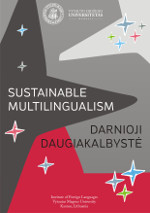LITHUANIAN POLITICAL DISCOURSE: EXPRESSION OF AGENCY AND RESPONSIBILITY
LITHUANIAN POLITICAL DISCOURSE: EXPRESSION OF AGENCY AND RESPONSIBILITY
Author(s): Vilma Bijeikienė, Nemira MačianskienėSubject(s): Applied Linguistics, Pragmatics, Sociolinguistics, Baltic Languages
Published by: Vytauto Didžiojo Universitetas
Keywords: agency;gender;leadership;political discourse;pronominal forms;self-reference
Summary/Abstract: In light of the changing picture of gender representation in politics and most importantly in political leadership, Lithuania should be granted a special position among examples of women political leaders’ success stories. On the one hand, the general proportion of female MPs in the Lithuanian Parliament Seimas , is not at all impressive with 26 female (18%) vs. 115 male (82%) MPs in 2008–2012 term and 34 female (24%) vs. 107 male (76%) MPs elected in 2012. On the other hand, however, the highest political offices in Lithuania were held by women in 2008–2012 term: namely the President of Lithuania Dalia Grybauskaitė, the Speaker of Seimas Irena Degutienė, the Minister of Finance Ingrida Šimonytė and the Minister of National Defence Rasa Juknevičienė. The situation itself can be seen as a breaking point with regard to widely-quoted stereotypic assumptions, for instance, professions related to politics, economics and military issues are typical male professions (R. Lakoff, 2000, 2003; Walsh, 2001) or some underlying statistical evidence like the one provided by Wodak (2003) that women rarely occupy the top authoritative positions. Moreover, with around two years in office in her second term President Grybauskaitė has been largely enjoying people’s support in popularity polls. This not only demonstrates a dramatic shift from traditional gender divisions of women being ‘silenced’ (Cameron, 1998, R. Lakoff, 1975), but also a rather significant move from the female discourse of resistance and survival presented by Martin-Rojo (1997) to the discourse of success. G. Lakoff (2004) claims that for political discourse to be successful it needs to be built on values. With these observations in mind, the present paper aims to investigate how such values as responsibility, fairness, active agency, etc. are delivered through choices of pronouns (Cf. Wilson, 1990) and equivalent morphological forms by the main political leaders in Lithuania: the President Dalia Grybauskaitė and the former Prime Minister Andrius Kubilius. The data for analysis come from transcripts of political interviews available in the media. The study is based mainly on qualitative discourse analysis with some quantification for comparison.
Journal: Darnioji daugiakalbystė
- Issue Year: 2016
- Issue No: 8
- Page Range: 60-80
- Page Count: 21
- Language: English

